"We continue to pray for victory and to do everything possible for Ukraine to win." – Sergey Rakhuba
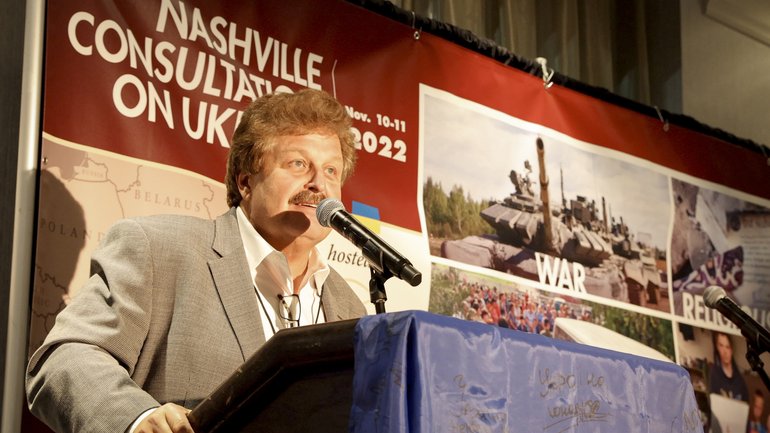
— Mr. Sergey, a meeting organized by Mission Eurasia was recently held in Nashville (USA). How did the idea of such a meeting with a Ukrainian delegation of Church representatives, representatives of civil society, politicians, and officials with American activists come about? Why was it necessary to hold it?
— First of all, it was necessary because of the situation in Ukraine. The war in Ukraine has been dragging on for a long time. The world, which responded so generously and was heavily involved in the first months of the war, started getting tired. Western media was reporting less and less. But the needs in Ukraine were great, and they were growing. That was how the idea came up. It was necessary to raise more awareness, attract more attention, and encourage the American community—we are mainly talking about the Christian community—for them to continue supporting the people of Ukraine and Ukrainian families during the crisis.
The four topics we focused on at this Consultation relate to the beginning of the war and the ideology of the "Russian world." The reason for the war is unclear to the average person in Western society, especially in America. It was a shock when Russia attacked Ukraine so treacherously. Therefore, everyone asks themselves: Why? Politicians know, but news channels continue talking only about the humanitarian crisis, yet not about the reasons, or the ideological component of this aggression on the part of Russia. We focused a lot on this, and there was a lot of interest. Our colleagues from Ukraine, representatives of all Christian denominations, leaders, representatives of the Institute of Religious Freedom, and members of Parliament covered a lot on this topic. It was an interesting discussion.
The next topic we considered was the consequences of the war—the humanitarian crisis. It was very timely as we generated more interest and attracted more resources and attention to the huge crisis in Ukraine today that is still intensifying. That was the purpose of this Consultation.
We continue working with the people who were represented there. They are numerous representatives of the humanitarian sector and organizations that already function in Ukraine. They were interested, or rather, they needed to comprehend the depth of the problem and the depth of the humanitarian crisis, which is multifaceted.
The next topic we covered was the role of the Church. The Church today bears such a huge burden, remaining a leader in responding not only to the humanitarian crisis, but also to spiritual needs. And it was so good to see this unity, despite all the diversity of Christian tradition and faith. It was so good to see the representatives of different Ukrainian denominations and leaders speaking unanimously. It was incredible.
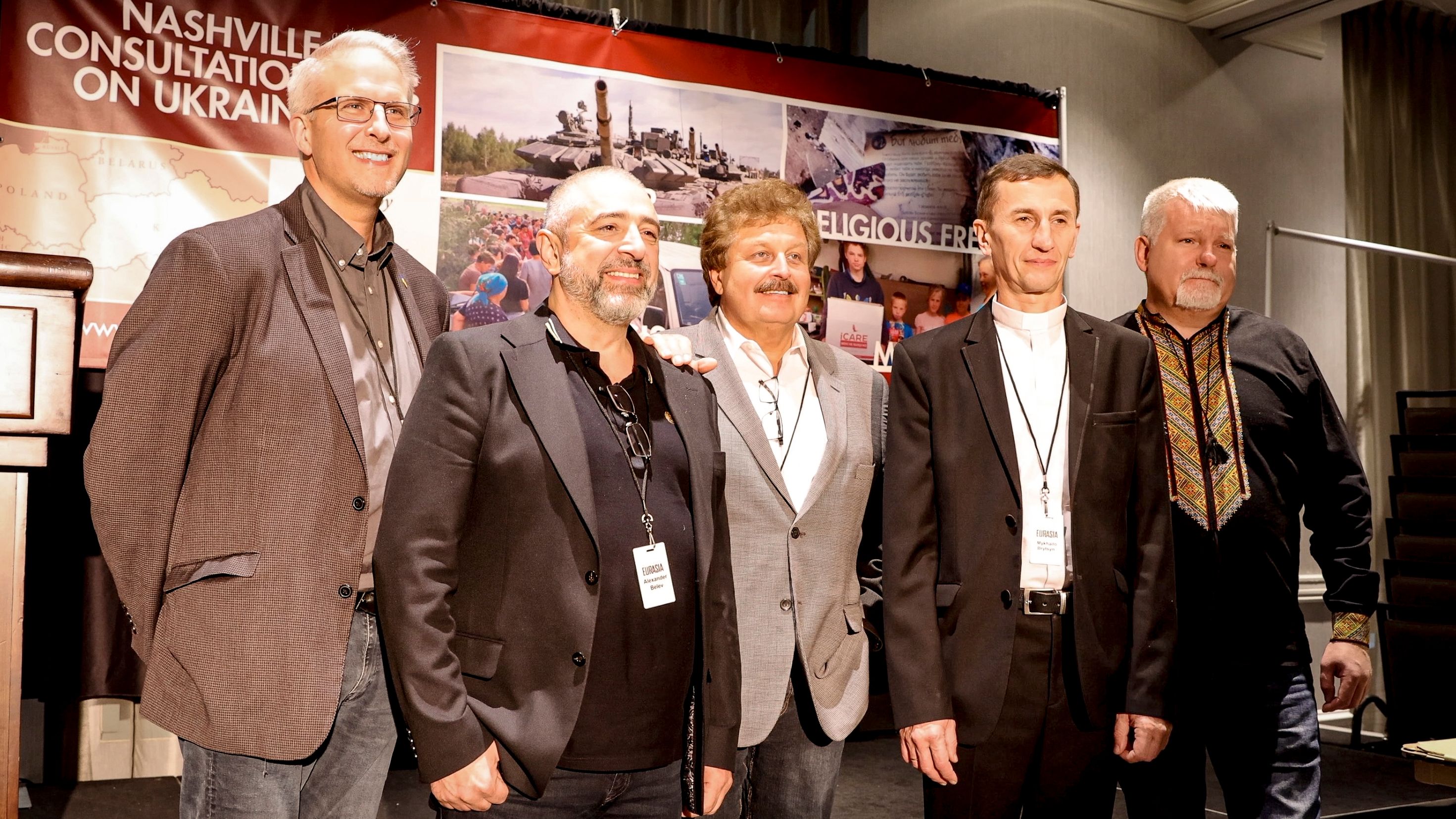
Some government officials who had promised to come did not make it, but this is understandable due to the war, the crisis, and its unpredictability. But the mayor of Irpin did attend. Having experienced the occupation of Irpin firsthand, he shared about looting, violence, the brutality of the Russian military, and devastation. Our ministry site [in Irpin] also suffered horribly in the first weeks of the war, as you know.
— Yes, we wrote about it.
— Maryan Zablotskyi, an MP of the Verkhovna Rada, spoke on the situation in Ukraine from the point of view of the Ukrainian administration and Ukrainian authorities in plenary and panel sessions. We signed a resolution that recorded the intentions of all participants of the Consultation to increase their efforts to provide comprehensive assistance to the suffering people of Ukraine through the ministries of Christian churches and missions.
— And what was the reaction of the American audience? Was there anything that they did not agree with, did not want to admit, or, on the contrary, that was a revelation for them? What was their response?
— Regarding the reaction of American society, I would probably put it like this. The representatives who were there absorbed literally everything. All the reports, information, and presentations from the representatives of movements who are right there in the center of this crisis today, and are leaders in providing humanitarian and spiritual assistance, were just staggering. Their response was to absorb everything. They obviously sympathize, but they learned a lot of new information. We learned much more than we had imagined about what was going on in general. There was no disagreement at all. There was complete, more than one hundred percent acceptance, sympathy, and confirmation that we will continue to support Ukraine and that we need to support it even better, deeper, wider, and more significantly.
There were, of course, questions of the following nature: What is the impact of this aid? Suppose there is something like this that is cultivated more on the news channels of the West, especially here in America. The aid that America sent is significantly bigger, and exceeds the aid from perhaps the rest of the world that is helping Ukraine. The West has united in helping Ukraine, but America plays a significant role in this, according to its economy, etc. But the question is: How does continued military aid help? Are there any significant changes, and where does this aid go? If the aid is coming, is there any corruption today in the center of this crisis? Those were questions during panel discussions, and this is okay because if a country provides a huge amount of aid, it would be good to know of its positive outcome and its significance.
Pavlo Unguryan, coordinator of the Prayer Breakfast Movement of Ukraine and MP of the Verkhovna Rada of Ukraine of the VI, VIII convocations, focused more attention on the fact that there is a deeper partnership between politicians. And that through their visits and presence, the American political elite provided enormous ideological or perhaps moral support to the Ukrainian government and Ukrainian political elite.
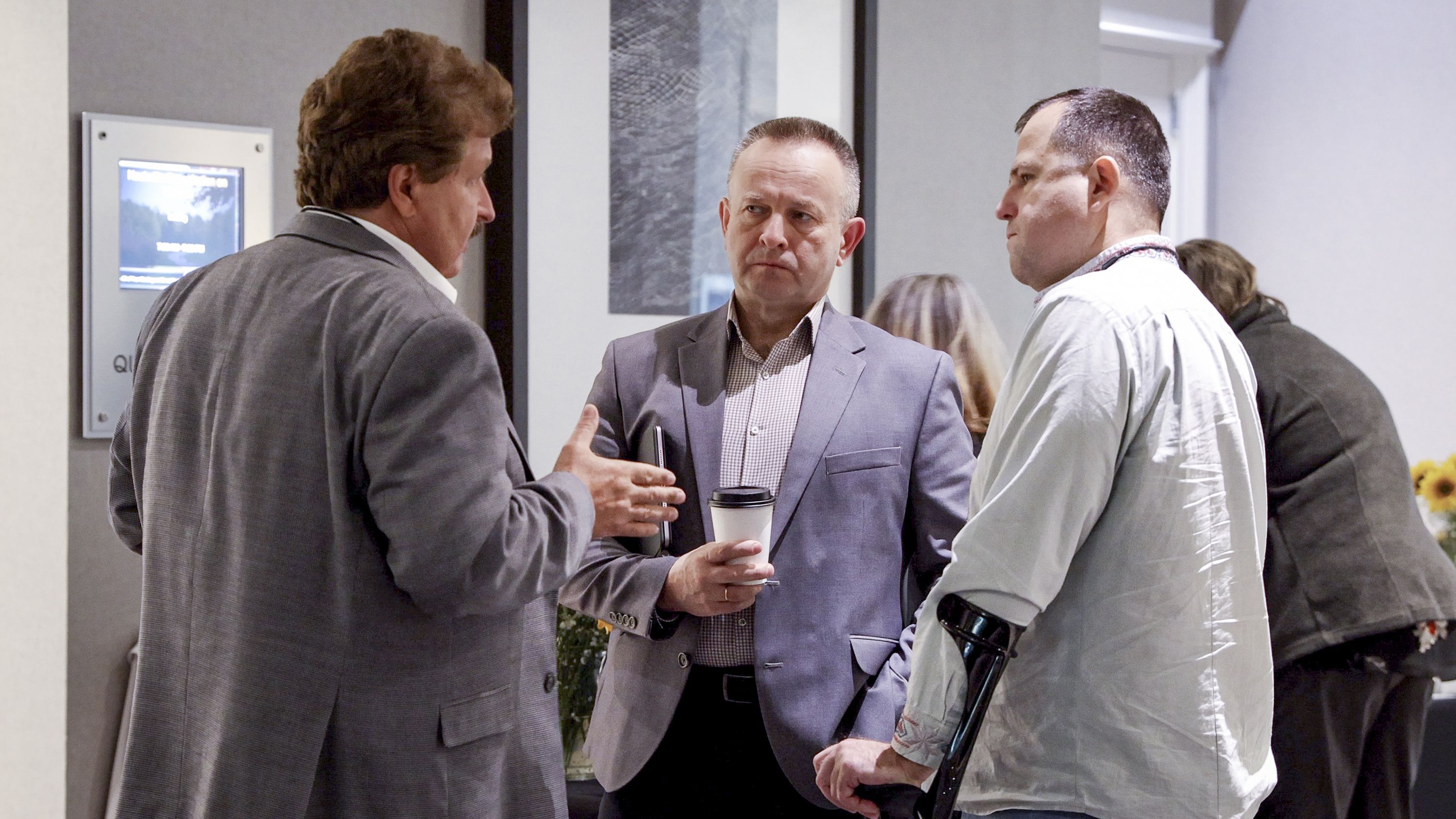
Overall, the Consultation exceeded my expectations. Currently, our donors, as we call them, our benefactors and our partners have become more actively involved. We have quite a substantial list. Their support has grown. And we continue increasing our support of Ukraine in the areas in which we work today. We have practically restructured our entire ministry by possibly 85%, to help the church and people to survive this crisis and win.
— There are different ways in which people can or may help. What conclusions did the people who were at the meeting come to? What is the most important thing to do to help Ukraine through Mission Eurasia now? Was there an emphasis on something specific?
— [The emphasis was on] assistance to the persecuted. Few people talk about it; Western media doesn’t know much about it. [Persecution is taking place in] the occupied territories where the Russians captured part of the territory, for example, in the Kherson region and most of the Zaporizhzhia region (I'm from Zaporizhzhia, so it's close to my heart). We provide assistance to the church and families who are under pressure from the occupying, marauding authorities today.
Our representative Mykhailo stayed in Melitopol until the end. He is the pastor of a large church. The church was taken over. [Russian soldiers] entered the church with weapons during the service, turned off the cameras, and locked the doors. They kept him for a long time, but he is quite a wise person. And now, the last remaning minister, a Greek Catholic priest, has been expelled from there. He and Mykhailo used to conduct city prayer meetings in the city square until the very end, until they were forbidden to do so under threat. Mykhailo made a stunning presentation, and people were deeply touched.
We have to support those who are under pressure today. [That can be done through] humanitarian and material support, increased financial support, and provision of food. As winter approaches, the crisis can seriously intensify. By the way, the Consultation coincided with the days when Kherson was liberated by our military. It was pure celebration.
— I know that among Protestants in the United States, in general, there was a fairly positive attitude towards Putin's activities. Many people, including some Ukrainian Protestants, considered him to be a defender of family values, Christianity, etc. Well, we see what kind of defender he is, we were greatly affected by it. Does the attitude towards Putin change in a conservative American environment, influenced by this war in Ukraine?
— Well, there are no questions here. Of course, not only it is changing rather seriously, it has changed already because this country (Russia — note by T.A.) is using terrorist methods to make some decisions, and it conducts occupational wars while attacking neighboring countries.
I can't speak for everyone, but it's the Protestant community today, the evangelical community, in America that stood in the gap. The main donations come from churches to help families, etc. You know the list of organizations that work very closely and powerfully in Ukraine, including Samarita’ns Purse, World Vision, and others.
The opinion has changed. Putin, who stole, cheated, and manipulated by adopting some semblance of morality, says, "That's why we fight against the West." But his actions today show that this is a lie. Genocide is not a Christian value, looting is not a Christian value, devaluing the lives of even his own people, I would say, is not a Christian value.
Of course, lack of information was quite misleading, but the Protestant community took it very seriously and stood in the gap for Ukrainian society.
— I know that there are many Russians in the so-called Slavic churches. Are they changing too, or are they having a hard time believing this information?
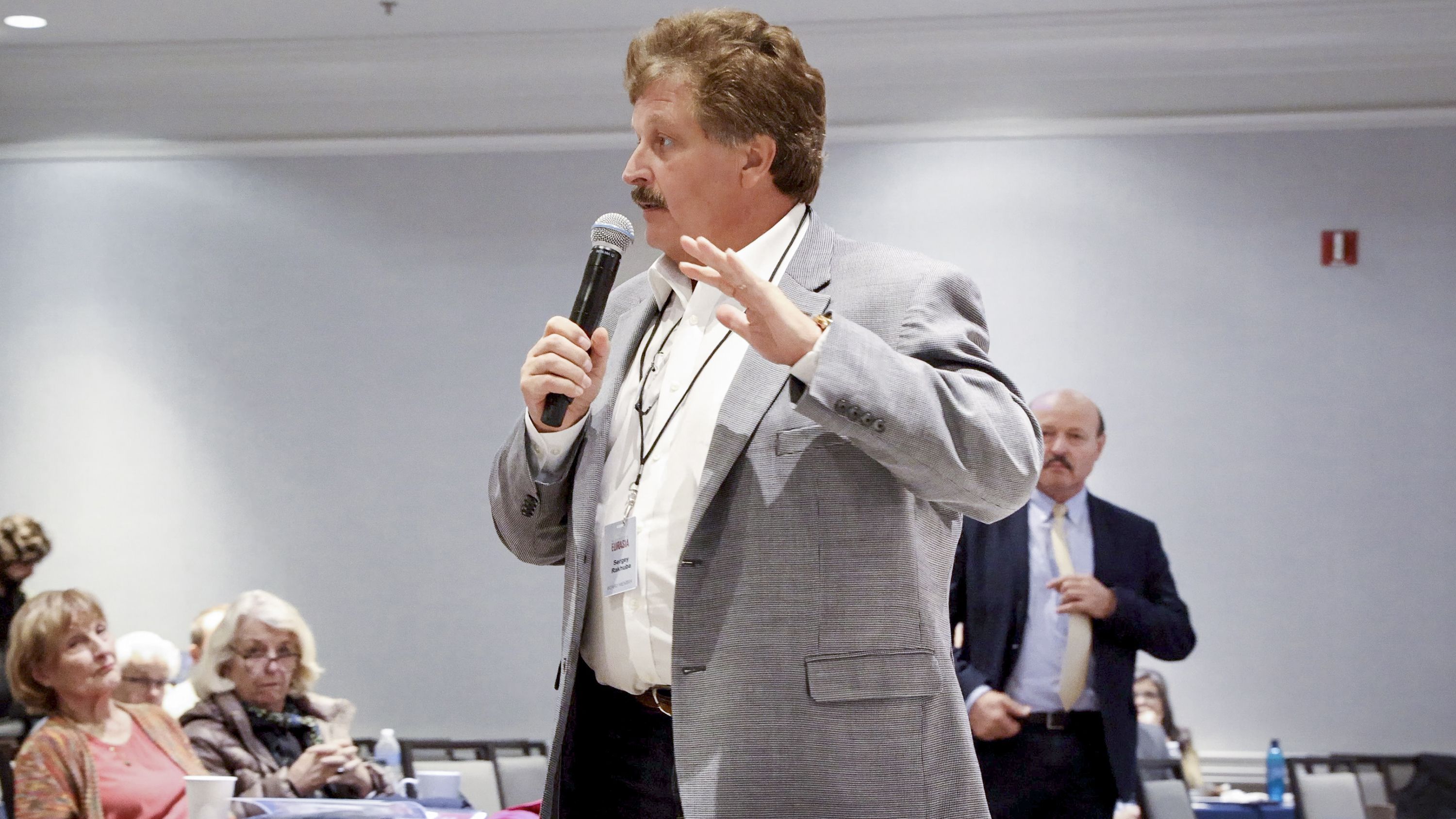
— Mr. Taras, this is a very interesting question. Many people avoid it because, you know, when a person realizes they have made a mistake, it’s very hard to admit it promptly. That is why there are some churches and groups that try to continue to avoid calling aggression an aggression. And if it is an aggression, they say: "We have nothing to do with politics.” And they add, "We pray for peace in Ukraine." That does exist in these communities, and it can be explosive. That is why there are leaders of churches, Slavic churches, who avoid talking about it publicly and at the same time continue supporting Ukraine financially.
I mainly work in an English-speaking American environment. But at the same time I maintain connections with the Slavic immigrant community, and I see it with my own eyes and feel it to some extent. This is an interesting question, and people get it rather fast. There are people who say, "We are neutral." But it is impossible to stay neutral, seeing that evil carries an immensely destructive power with such an aggression. That is why people are seeing the light, so to speak.
— That’s great. Regarding the activities of your ministry in Ukraine now. There are not many employees left here, but they are actively working. We constantly see new projects. What areas need to be developed first? As I understand it, you are not going to rebuild the office in Irpin yet, are you?
— Our building was destroyed, but our vision wasn’t. We were shocked for a while by the very fact that our building was destroyed – the building where so much was going on, where plans were made, where discussions, seminars, planning meetings were held, and where strategies were generated. It was a crucial center of our ministry in the post-Soviet countries.
Ukraine became such a hub for us, from where the ministry spread further to all the countries of the former Soviet Union. Therefore, it was so treacherous and unexpected. No one believed that there would be a war, although there was a lot of talk about it. That was why when they occupied [our building], then destroyed it and blew it up, and burned all our materials, we were shocked.
We evacuated our families. We looked for accommodation for them. But at the same time, from probably the third day of the war, we were already making [ministry] plans. We were scattered, that is, our team and leaders, but we already started the mechanisms of delivering necessary aid from the first days of the war. The second week into the war, I was at a checkpoint in Poland. We already knew that it was a huge disaster and that it was a long-term problem. And we were making long-term plans even then.
I wouldn’t say that our team has shrunk, [rather], it is bigger today. The only thing is that we do not have one centralized office, we are not tied to a building. We are united by one idea. Therefore, we continue to be a leading ministry in the center of the crisis. Recently, in one study, we were named as one of the most significant national ministries in Eastern Europe that provides a large amount of assistance: humanitarian, psychological, and financial aid to Ukraine during this war.
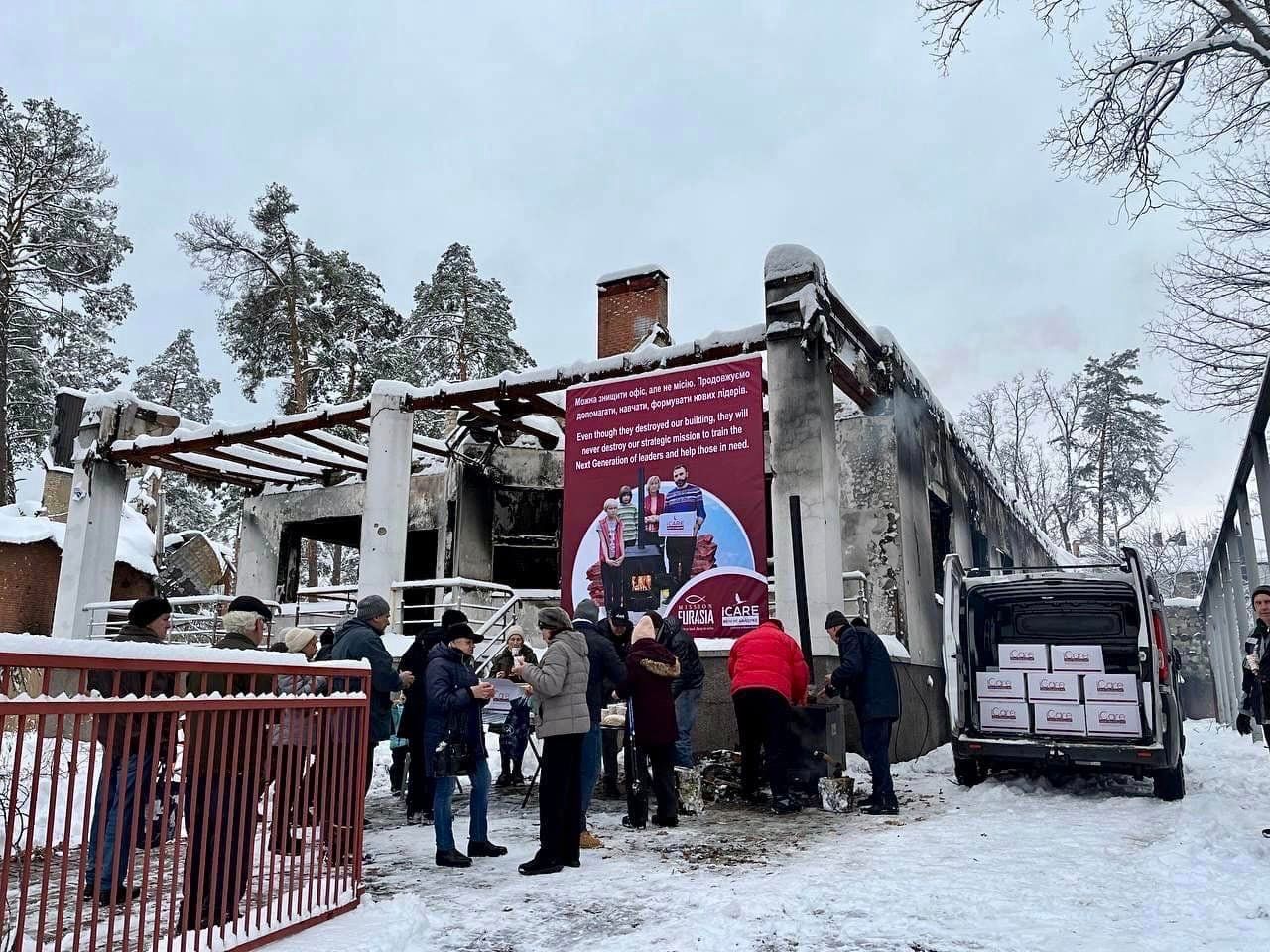
So, our building is destroyed, and we are shocked, but we are not broken. We take every opportunity during the crisis to continue to help.
We have several centers for the distribution of humanitarian aid, that is food supplies. We continue to distribute family food packages. One package is large enough to support a family of 4-5 people for at least a week. Two hundred thousand of such family food packages have already been packed by the volunteers mobilized by our teams in several centers of Ukraine — in Chernivtsi, Lutsk, Korosten, Zaporizhzhia, Kharkiv, Mykolaiv, and Odesa.
We publish a lot of Christian literature. A million copies of the Holy Bible have been released and have already been distributed to the displaced and to refugees. We have opened three refugee assistance centers outside of Ukraine: two in Poland (in Warsaw and Krakow, where at least 100-150 refugees from Ukraine get assistance every day) and one in Moldova (in Chisinau).
Now, with winter approaching, we have several big projects. Statistics say that about half of Ukraine's children suffer from this war. Children who crossed the border with their mothers and grandmothers (their fathers stay in Ukraine) need psychological, material, and spiritual help. This Christmas, we are trying to raise enough resources to give 100,000 children special Christmas gifts. We call them Gifts of Hope. Seventy-five thousand of them are already being packed and will be distributed in Ukraine in the liberated territories where there are children, and in the western territories of Ukraine. These are Ivano-Frankivsk, Lutsk, Chernivtsi, Mukacheve, Lviv; they are western territories where there is a huge concentration of displaced people. During Christmas, they will be somewhere in a shelter in cramped conditions, in a rather difficult economic situation, and in wintertime. Therefore, we thought that a gift could bring back a smile to a child who has lost almost everything, lost the opportunity to be happy, lost their hometown, house, and school. Children in particular are affected by this war.
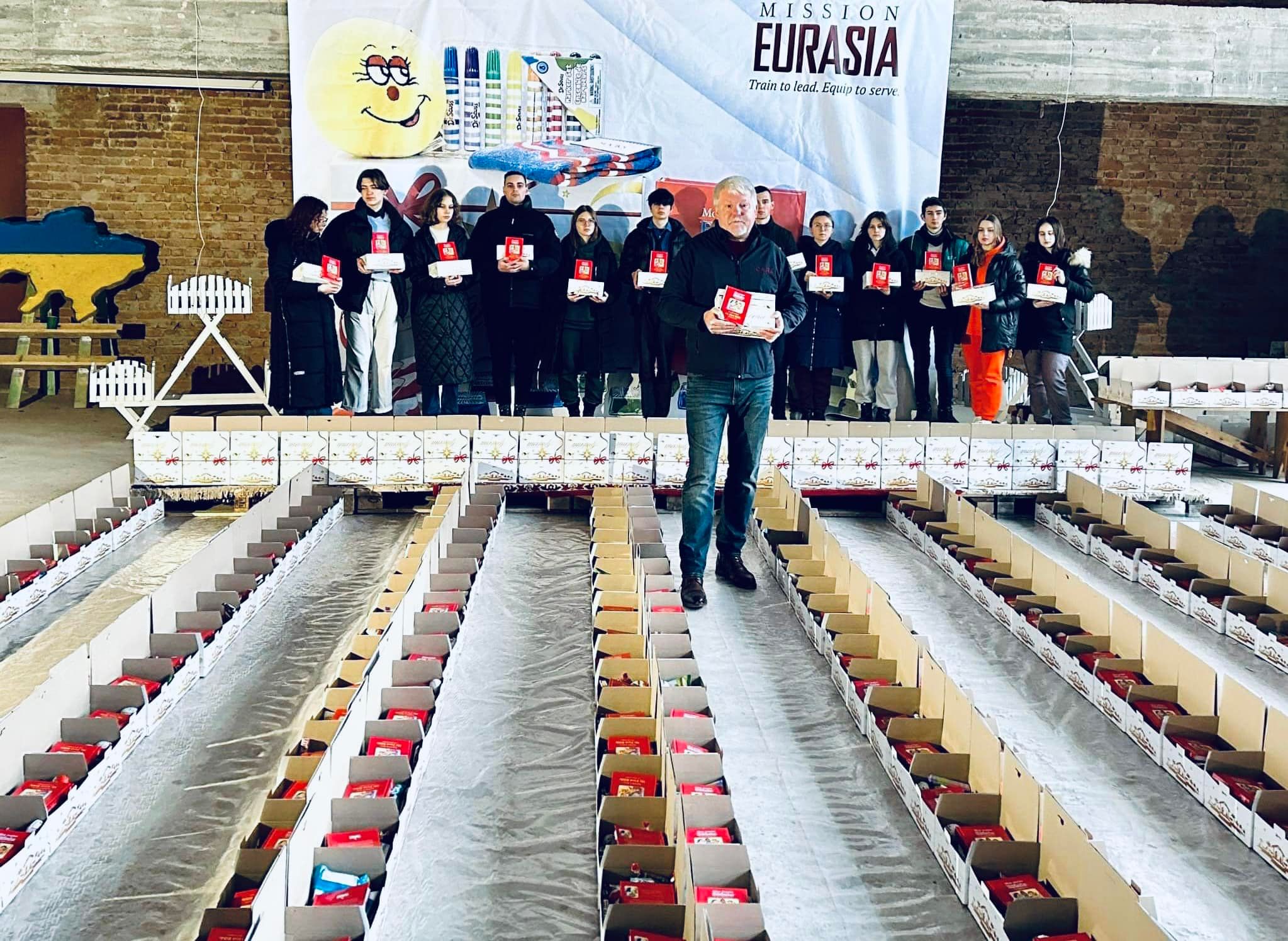
We are currently preparing 100,000 Christmas gifts and have already started distributing those, but the main distributions will be from December 20th untill January 5th. [The project is carried out by] hundreds and hundreds of volunteers who are mobilized by the teams of School without Walls, our training program for young leaders. It’s an incredible project to encourage children and their families that they are not left behind. At Christmas, we bring them this gift, and we also share the story that all hope is in God. And although conditions are difficult, and we cannot answer why the Lord allows this to happen, it symbolizes that God is with us during a crisis, during a war. Christmas cannot be stolen from children while there are people of good will who generously donate. And Americans generously donate to this project.
I currently devote a lot of time to creating a financial, economic and spiritual basis for this. We mobilize numerous volunteers, and we work in partnership with countless churches in Ukraine – those that are affected but continue to serve their communities. This is beyond any denominational or confessional boundaries. We work with all people and churches of goodwill.
The next project [is this]. It is winter, and it is already freezing cold, it snows. For those especially in the liberated territories and, in fact, in the villages in western Ukraine where there are a lot of displaced people, we started manufacturing and are now delivering wood-burning stoves, or "burzhuika", as they were once called. We make them together with one factory. We created several job opportunities specifically for displaced people who had to leave the places where there is war and destruction in the east and south of Ukraine. And even now, as we are talking, a large truck with dozens of these stoves is making deliveries to those territories.
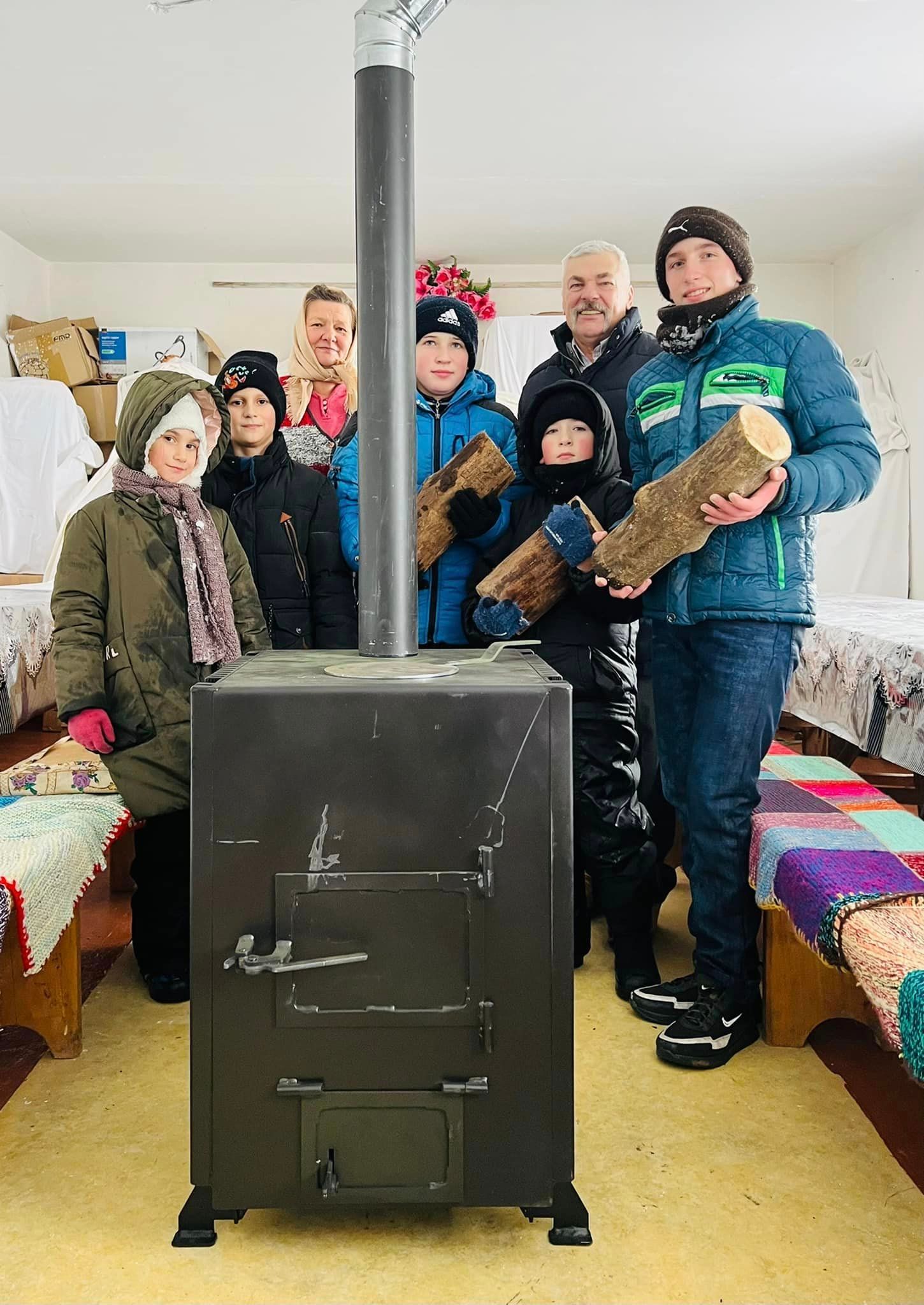
Our plan is to collect, make, deliver, and install them for those people who need the most basic heating in their half-ruined places, especially now, when the Russian army is deliberately destroying the energy system. President Zelensky says that already about 40% of people are left without electricity, without heating, and without hot water; they cannot cook food. And these stoves are a rather substantial aid. We offer a family a stove and enough firewood for two weeks. Volunteers stock up, saw, chop, and pack this firewood. We have a center where all of this is done in Korosten. And we plan to install two thousand of these stoves in churches and homes where there is a need.
We provide a lot of psychological support. We teach people through our contacts, our experience of working with a young community of Christian professionals, numerous psychologists, volunteer psychologists who have skills, who work with families and children, helping them to overcome psychological trauma and its consequences.
— Mr. Sergey, the final questions. You’ve recently visited Ukraine. You probably come more often now than you used to come because there was no such urgent need. How do you see Ukraine now? How much is it changing? Are you optimistic?
— I am heartbroken because Ukraine is my homeland. Ukraine is the country where I was formed. It’s my motherland. There is a lot to it. Therefore, it is extremely difficult to see my homeland [this way] and people who are suffering. I have a family in Ukraine. We do all we can. The fact that I keep coming and what I can mobilize here—is all to help Ukraine; and that's all I can do.
I am proud of the people of Ukraine. I knew that the Ukrainian people are invincible people. Therefore, I am glad to see this courage, to see that war unites people, to see that the Church in Ukraine is united and mobilized and continues to minister through tremendous difficulties, being a stronghold of spiritual leadership in society. This is what I see.
We continue to pray for victory. We do everything possible for Ukraine to win, and we undoubtedly believe in it. The world is shocked by Ukraine's resilience. I see more because I am part of it all, though I have been living in America for over 30 years. You see, this cultural transformation and understanding of it — I see both from the outside and from the inside. I see it more deeply than my American colleagues.









